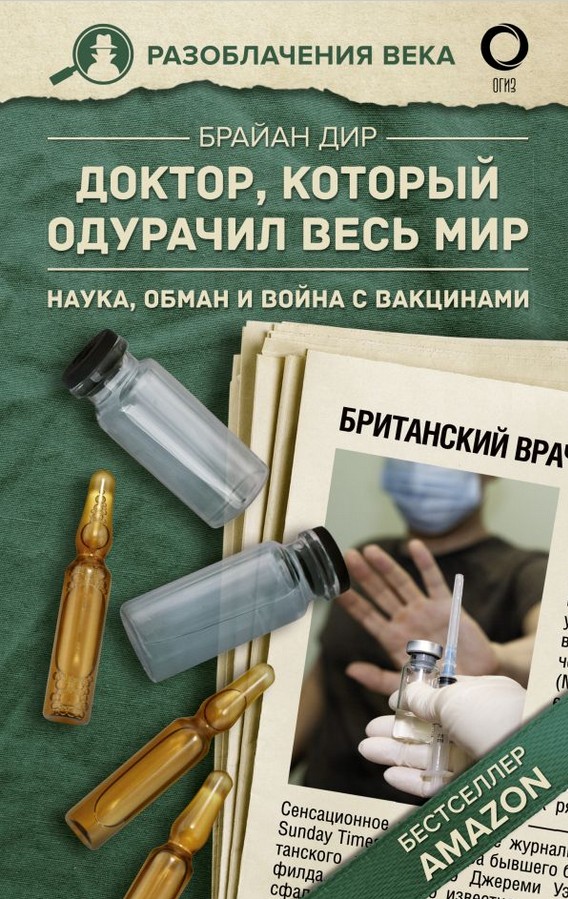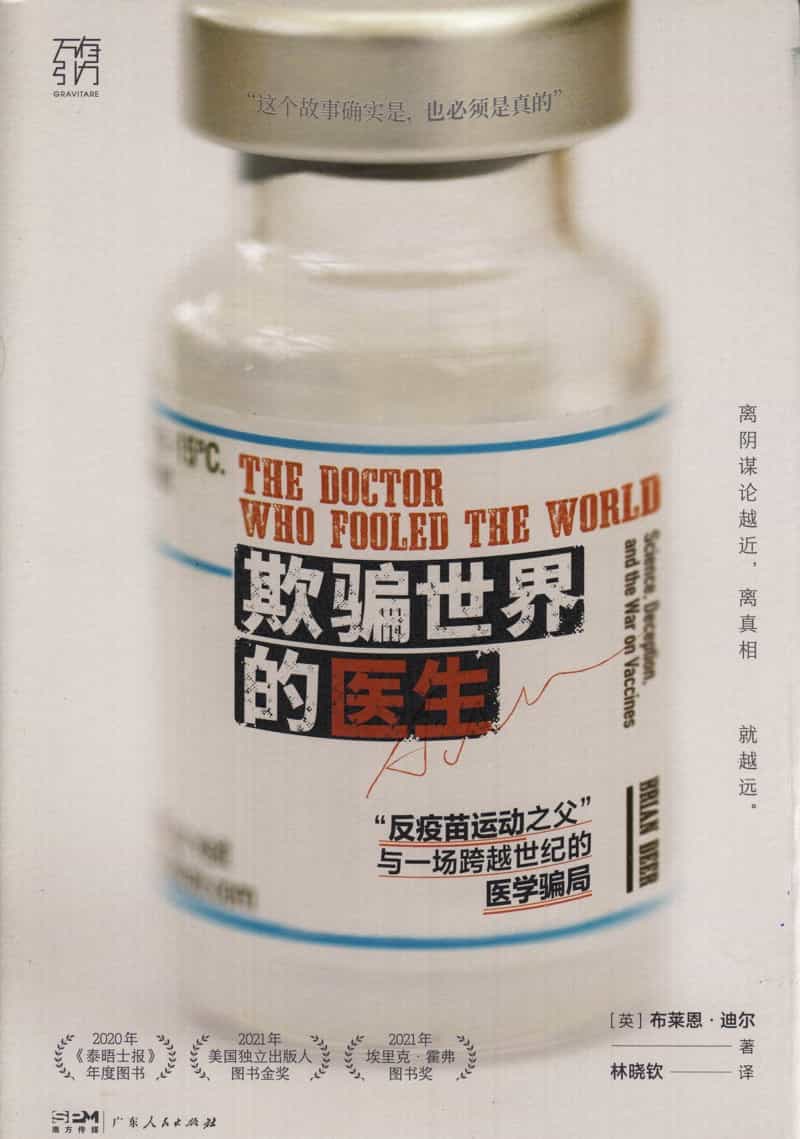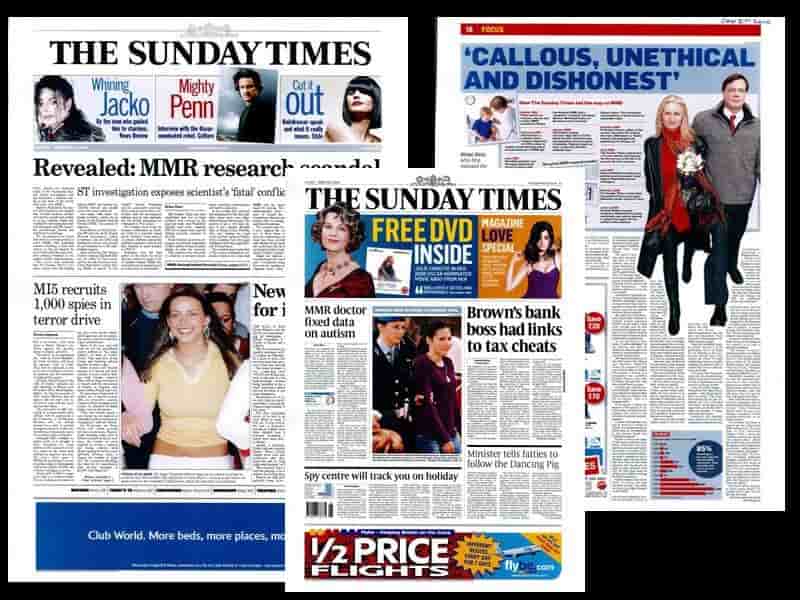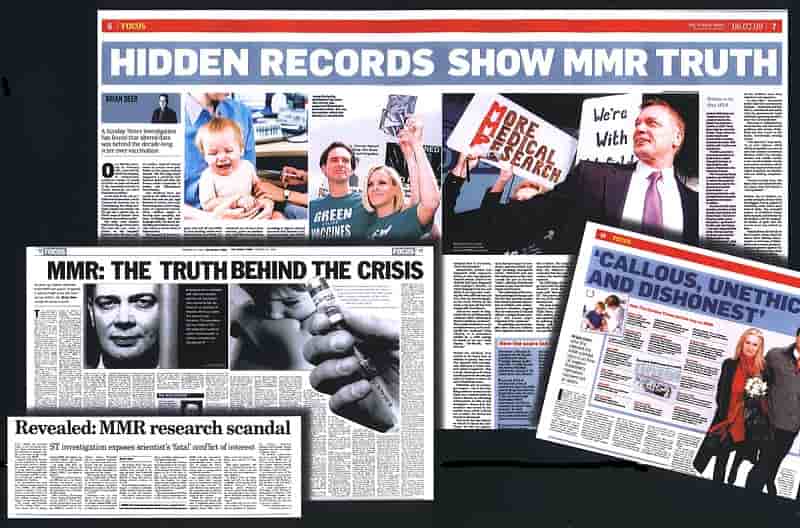
Checking ‘The Doctor Who Fooled the World’ is true
Unprecedented safeguards surround the investigation of Andrew Wakefield. Brian Deer reveals his proof of truth
When I’m overseas talking about the investigation behind my book, The Doctor Who Fooled the World, I often kick off with a question: “Why me?”
Why would an audience in, say, São Paulo, Brazil, or Vojvodina, Serbia, want to listen to a journalist from London, England, about an international war on a mainstay of medicine being led from the United States?
A quick answer is England is where this war started. It’s the birthplace of conflicts over vaccines. And for a quarter of a century (with time off for good behavior) I’ve tracked what’s come to be known as the “anti-vaccine movement,” monitored its migration from the UK to America, and from there to the rest of the world.
With the COVID–19 pandemic this movement went bigtime, and any number of books are out there today, touting advice, reviewing research, and arguing what does or doesn’t cause whatever. Usually, they’re written by vaccine developers or others on a mission to persuade.
My book isn’t one of them. I’m not one of them. And mine isn’t even a book about vaccines. Rather, it’s a story of real people and specific facts: the who, what, why, and so what? of something memorably dubbed the “elaborate fraud” that my investigation of the controversy uncovered.
After criticising vaccines as long ago as 1988, my research began in earnest some eight years later, producing an award-winning investigation in The Sunday Times Magazine into a British-born scare in the 1970s and 1980s over a shot against diphtheria, tetanus, and pertussis.
That story was printed in November 1998. And in the same year the magazine ran another long inquiry of mine: into a putative “world’s first AIDS vaccine,” AidsVax. I not only revealed why that shot could never work, but documents I obtained led to a federal prosecution (settled with a fine) of a senior manager at the US Centers for Disease Control and Prevention. He’d approved government grants for the no-hope product without disclosing his deal to join the company behind it.
By that time, I felt pretty much vaxxed out. But in September 2003 I was given a routine assignment to look into what was then a crisis in UK public confidence over the triple measles, mumps, and rubella vaccine (MMR) triggered by claims linking it with autism.
This was the height of the “MMR scare” in Britain, and my inquiries were meant to take maybe a couple of weeks to bash out. But after I stumbled into a rats’ nest of astounding misconduct, it grew into the biggest probe into medical research by any journalist in living memory.
My first MMR story, published in February 2004, was so explosive that a media firestorm erupted in Britain. I followed this with dozens of Sunday Times exclusives, an hourlong network TV exposé, and a four-part series for a top medical journal. Then, after I’d cracked what’s been called “perhaps the most damaging medical hoax of the last 100 years” came more shocking discoveries for my book.
But The Doctor Who Fooled the World isn’t a dry medical text. As a reviewer for the science journal Nature pointed out, it’s a human story: a portrait of “hubris” and the terrible dark shadow it can cast.
The (now ex-) doctor in question is an Englishman, Andrew Wakefield — lauded as “father of the anti-vaccine movement.” And his mischief rippled out from a London hospital where, secretly payrolled by a small-town lawyer named Richard Barr, he faked evidence to link the shot with autism and a “bowel disease” (that I later revealed doesn’t even exist) — spawning fear, guilt, and outbreaks of measles everywhere from Shanghai to Stockholm.
One man; one vaccine. At least in the beginning. But this story lays bare what has grown over the years and how it has morphed into attacks on all vaccines. Drawing in other characters, who earn their moment in the sun, here’s a plot that not only seeps into the coronavirus catastrophe but reveals how science can so easily be corrupted.
“A load of lies?”
The reply to my disclosures has been denial and abuse. “A load of lies,” is a typical rejoinder. The most vile are sourced to one Clifford Miller, a (now ex-) lawyer working for Wakefield. Miller spent two decades (yes, twenty years) defaming me with a campaign of (mostly anonymized) fabrications.
Wakefield, meanwhile, deceives his supporters — even claiming I’m working with the pharmaceutical industry. But, if you’ve fallen for that one, check out this website (including my award citation for investigating drug companies). He spews a deluge of deceit to cover his tracks.

And yet, not only do parents of children enrolled in his now-notorious research (written-up by Wakefield alone) in the Lancet medical journal — that my work caused to be retracted as both dishonest and unethical — confirm it to me as “fraudulent” and “a complete fabrication,” but, step by step, my evidence has been checked by editors, producers, peer reviewers, and lawyers, plus a five-member panel of the UK General Medical Council (GMC) including two senior independent lay members.
Among dozens of charges upheld by that panel (against Wakefield alone and none of his associates) were one of dishonestly concealing the true source of children in his research; two of lying to doctors and scientists trying to understand his methods; and another his own counsel, Kieran Coonan QC, submitted to be a charge of “fraud.”
Wakefield also lies about that GMC case: telling supporters he wasn’t insured and so couldn’t appeal the verdicts. The truth, however, is he was insured — by the UK’s Medical Protection Society — but his lawyers told the society he wouldn’t win. And a high court judge later found him responsible for a false claim of ethics approval in The Lancet.
Unsurprisingly, the consensus on Wakefield is clear. As the most senior managers at the US National Institutes of Health wrote in August 2017:
“The claimed causal connection between childhood vaccines and autism, based on an initial British study that has conclusively been shown to be fabricated, has been exhaustively studied in hundreds of thousands of children and resoundingly rejected.”
I couldn’t be prouder for having exposed this wretch. And I know of no journalism more extensively vetted than mine on any subject, anywhere, ever. Not, I should stress, because I’m worried about my facts, but because Wakefield has a history of conning lawyers, enablers, and especially vulnerable parents, with vexatious, timewasting complaints and lawsuits in his attempts to hide from the truth.
He even threatened my book, in advance of publication, before slithering silently back into the undergrowth after lawyers for my North American publishers, Johns Hopkins University Press (JHUP), told him where he could stick it.
“We have reviewed these allegations of misconduct against Deer,” they warned James Moody, a (later disbarred) Wakefield attorney and business partner, in reply to forty-six pages of concoctions and abuse. “But there is nothing in those many pages of invective that erodes our faith in Deer or his groundbreaking reporting. To be clear, Johns Hopkins University retains full confidence in Deer and his book.”
By that time I’d endured enough of Wakefield’s antics and had long been ready to see him off. As far back as November 2010, I’d written to the editor-in-chief of the British Medical Journal to secure an extra round of pre-publication verification of my findings for a BMJ series (prompting sixty hours of legal review):
“Part of my learning curve is to recognise that aspects of the BMJ approach to clinical evidence and peer review leak over into its approach to journalism… However, journalism must often work to a higher standard, particularly in matters of reputation. As you’ll realize, that standard is not plausibility, it is accuracy and truth. Names are named. Facts can be checked by others.”
Underpinning my reporting — and its effect on public attitudes — lies more than twenty-five thousand documents and recordings which I indexed for the newspaper and the journal. These include Wakefield’s undisclosed patent for his own measles vaccine; details of his enormous secret income from a sure-to-fail MMR lawsuit; recordings of the lawyer Barr admitting to me he paid for the Lancet research; and proof Wakefield tricked even his closest colleagues, such as a professor John Walker-Smith.
Two thousand of these items were footnoted in my book’s manuscript and, at my request, checked individually by JHUP staff to ensure what I’d written was substantiated.

Wakefield had already scammed supporters to fund hopeless libel actions (which a senior judge described as brought for “public relations purposes and to deter other critics”). So I felt unparalleled checking to be vital.
As I wrote to JHUP in September 2019:
“The best way to avoid any lawsuit is to make it crystal clear to anyone who Wakefield goes to for money (telling them that it’s all lies, as he’s done twice before), that the story is true, has been checked at arms’ length from me, and no claim of defamation stands any prospect of success.”
Some folks suckered by this manipulative individual fail to recognize that (unlike Wakefield) if I made up stuff I’d be professionally finished and, especially with England’s libel laws famously favorable to plaintiffs, might expect to lose my home to legal costs.
This story is so detailed and my reporting so persistent, moreover, that either it’s honest and correct — in substance and sting — or Wakefield must be victim to the most sustained barrage of malicious defamation in the history of the English language.
But if the latter were the case, this acknowledgement would expose me to the risk of disgrace and bankruptcy, with my publishers contractually entitled to pulp my book and make me pick up the bill.
And, finally, in case you labour under the “pharma shill” deception, the book declares all sources of money:
“The investigation that became The Doctor Who Fooled the World was funded entirely by The Sunday Times, London; the Channel 4 TV network; The BMJ; publishers’ advances for this book; and a check from Wakefield’s lawyers, on his behalf, to cover legal expenses for my website.”
Unlike the abuse and relentless lying from Wakefield and his enablers, my book has been cleared by libel specialists (in both New York and London). Under penalty of perjury, I’ve filed hundreds of pages of statements for courts and been deposed by Wakefield’s lawyers for six-and-a-half hours.
Incredible it may be. False, it can’t be.
This story is, and would have to be, true.



RELATED:
Vexatious Wakefield lawsuits fail
